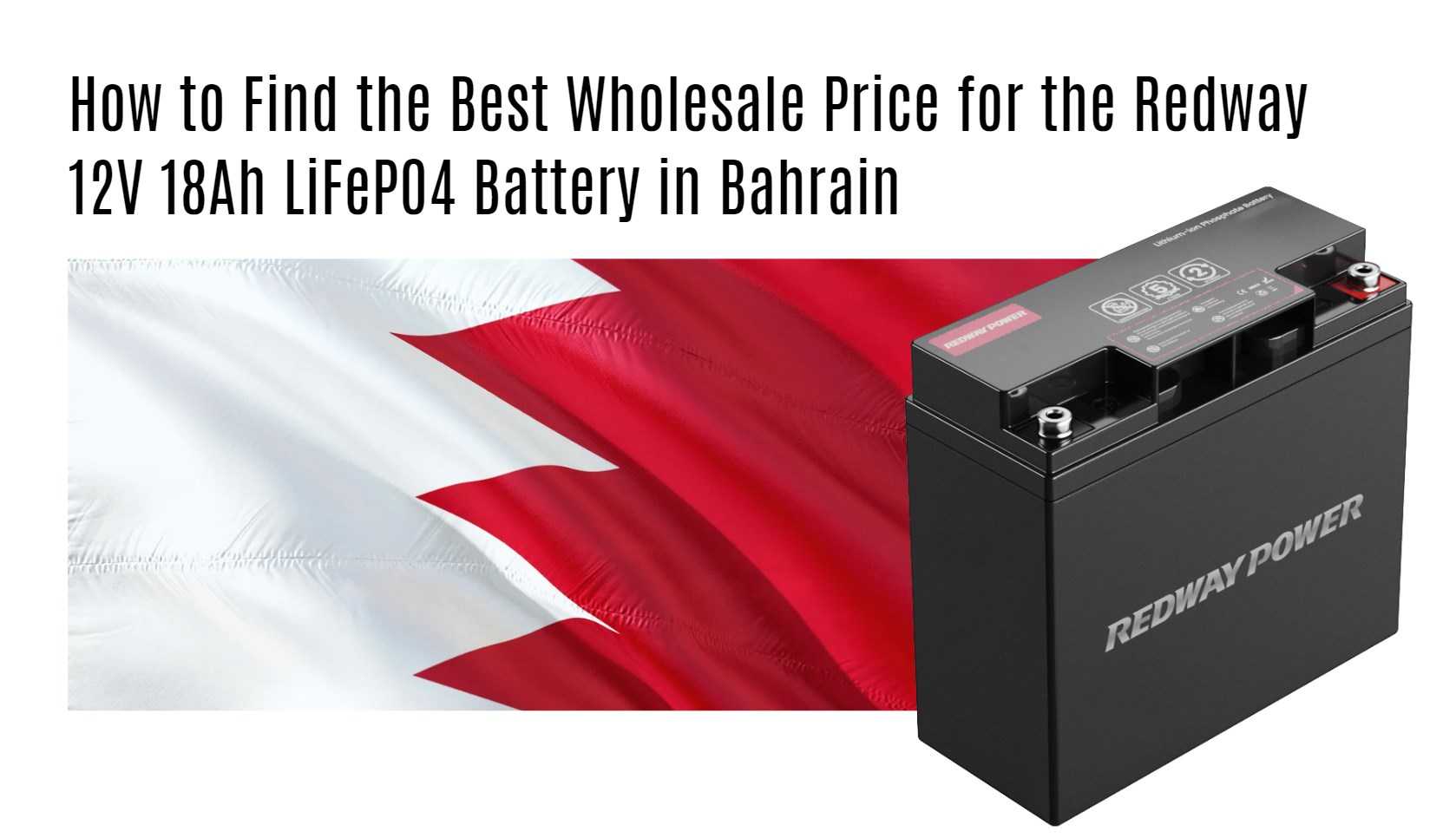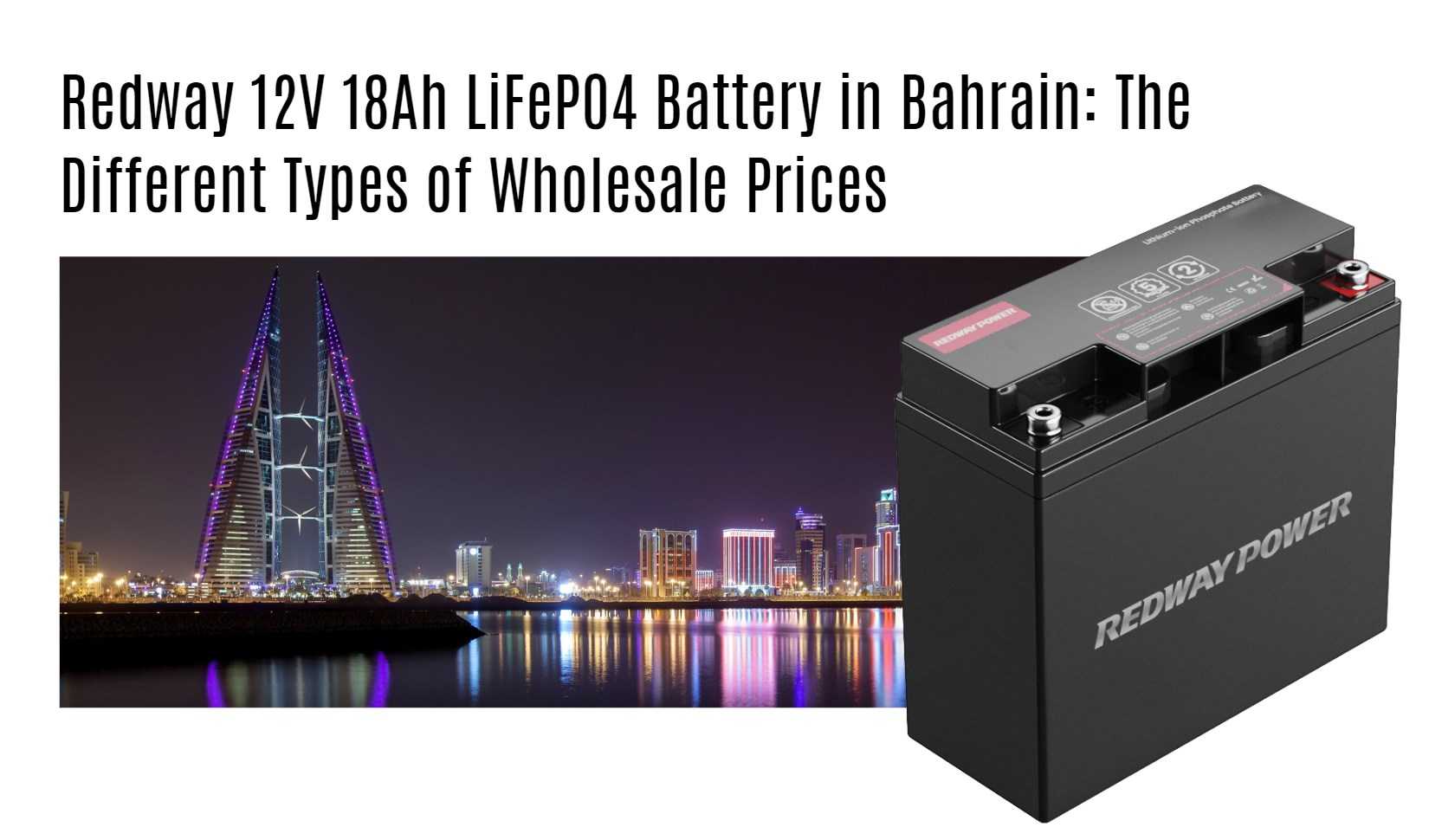Are you looking for a reliable and cost-effective power source for your business or personal use? Look no further than the Redway 12V 18Ah LiFePO4 battery! This high-quality battery is gaining popularity in Bahrain due to its long-lasting performance and eco-friendliness. But how can you get this product at an affordable price? In this blog post, we’ll explore different types of wholesale pricing, their pros and cons, and most importantly, how to find the best wholesale price for the Redway 12V 18Ah LiFePO4 battery in Bahrain. Let’s dive in!
What is the Wholesale Price?
Wholesale price refers to the cost of a product when it is purchased in large quantities directly from the manufacturer or distributor. This price is usually lower than the retail price, as bulk purchases save on production and transportation costs.
The wholesale price can vary depending on several factors such as quantity, location, and negotiation skills. For instance, purchasing a larger volume of Redway 12V 18Ah LiFePO4 batteries will result in a lower per-unit cost compared to buying just one or two units.
Wholesale lithium golf cart batteries with 10-year life? Check here.
It’s worth noting that there are different types of wholesale pricing models like cost-plus pricing which adds up all expenses incurred in production plus profit margin, markup percentage where the retailer marks up their purchase cost by an agreed percentage before selling at retail prices among others.
While wholesale pricing may seem appealing for businesses looking to reduce overhead costs or make a profit through reselling products, it’s important to consider other factors like market demand and competition before making any purchase decisions.
Want OEM lithium forklift batteries at wholesale prices? Check here.
The Different Types of Wholesale Prices
When it comes to purchasing goods in bulk, wholesale prices are the way to go. However, not all wholesale prices are created equal. There are several different types of wholesale pricing structures that businesses can use.
One type is cost-plus pricing, which involves adding a mark-up percentage to the total cost of producing an item. This method ensures that the seller covers all costs and makes a profit.
Another type is fixed-price or flat-rate pricing. This structure sets one price for all products regardless of quantity purchased. It’s simple and easy to understand but may not always offer the best deal.
Tiered pricing is another popular option where discounts increase as volume increases. This encourages bulk purchases and incentivizes customers to buy more.
There’s dynamic pricing which changes based on market demand or inventory levels in real-time. While this approach can maximize profits, it can also be unpredictable for buyers.
Choosing the right type of wholesale price for your business depends on your product and customer base. By understanding each structure’s benefits and drawbacks, you’ll be well-equipped when making purchasing decisions in bulk!
Pros and Cons of a Wholesale Price
Wholesale prices are great for both buyers and sellers. Wholesalers benefit from selling in bulk, while customers get lower prices compared to retail purchases. However, just like any business strategy, wholesale pricing has its pros and cons.
One of the advantages of wholesale pricing is that it allows businesses to purchase products at a discounted price, making it easier for them to resell those items at competitive rates. Wholesale prices can also help companies save time by buying large quantities all at once instead of purchasing individual units over time.
On the other hand, one disadvantage of wholesale pricing is that sometimes smaller retailers may not be able to afford large quantities or minimum order requirements set by wholesalers. Another potential risk is overstocking if there aren’t enough sales made after purchasing a big inventory.
Whether you should offer wholesale pricing depends on your business goals and financial situation. By evaluating both pros and cons against your objectives for growth and profitability, you can make an informed decision about whether this strategy aligns with your long-term vision.
What is the Best Wholesale Price?
The best wholesale price is subjective to each individual business. It ultimately depends on factors such as production costs, competition, and profit margins. However, a good starting point for determining the best wholesale price is to research the market demand and analyze competitors’ pricing strategies.
One approach could be setting a price that allows for competitive advantage while maintaining profitability. This means offering prices lower than competitors but still earning enough profit to cover expenses and generate revenue.
Another method could be implementing tiered pricing based on quantity purchased by customers. This incentivizes larger orders from buyers, giving them more value for their money while boosting sales volume for the supplier.
It’s also important to consider long-term relationships with customers when determining prices. Offering consistent quality products at reasonable prices can foster loyalty among clients who will continue doing business in the future.
Finding the best wholesale price requires careful analysis of multiple factors including competition, production costs, customer demand and more. Striking a balance between affordability and profitability should always remain a top priority for every successful business owner striving towards growth and success in today’s highly competitive marketplace.
How to Get the Best Wholesale Price
Getting the best wholesale price can be a challenging task, especially if you are new to the industry or market. However, there are several ways in which you can secure an advantageous deal for your business.
Firstly, it is crucial to research and compare prices from different suppliers and manufacturers. This will enable you to identify any discrepancies or differences in pricing and help negotiate a better deal.
Secondly, building relationships with suppliers over time can lead to favorable rates that may not be available elsewhere. Therefore, it is essential to maintain good communication and establish trust with your supplier.
Thirdly, purchasing in bulk quantities often leads to more significant discounts as suppliers prefer larger orders for efficiency purposes. So if possible always try buying products in large amounts.
Fourthly, being flexible about delivery times can also result in lower prices as some wholesalers offer deals for off-peak periods when demand is low.
Lastly but most importantly keep yourself updated on market trends and emerging technologies like LiFePO4 battery technology popular nowadays because having knowledge of what’s going around will give you an advantage during negotiations.
Conclusion
To sum up, if you’re in Bahrain and looking for a reliable LiFePO4 battery, the Redway 12V 18Ah is definitely worth considering. Its lightweight design, long lifespan, and fast-charging capabilities make it an ideal choice for a variety of applications. Plus, with wholesale pricing available from reputable suppliers, you can get this high-quality battery at a great price.
When it comes to getting the best wholesale price possible on the Redway battery or any other product, there are several strategies you can use. These include buying in bulk, negotiating with suppliers, and comparing prices across multiple vendors.
Remember that finding the right supplier is just as important as finding the right product. By working with a trusted partner who understands your needs and offers competitive pricing and reliable service, you can ensure that your business stays competitive and profitable over time.
So whether you’re in Bahrain or any other part of the world looking for top-quality batteries at affordable prices – be sure to consider Redway along with your other options. With its numerous advantages and strong reputation in the industry – it could be just what your business needs to succeed!
FAQs
LiFePO4 Battery Performance in Bahrain’s Desert Climate
LiFePO4 batteries, also known as lithium iron phosphate batteries, offer high energy density, extended lifespan, and enhanced safety features. In Bahrain’s desert climate, it is crucial to understand their performance. Operating LiFePO4 batteries within the recommended temperature range ensures optimal performance and longevity. Cold temperatures can decrease capacity and slow discharge rates, while high temperatures can accelerate self-discharge rates. Proper temperature management, including insulation and thermal management systems, is essential. Maximize the performance and lifespan of LiFePO4 batteries in Bahrain’s desert climate with proper temperature control.
Understanding the Cost of LiFePO4 Batteries for Residential Use in Bahrain
The cost of LiFePO4 batteries is influenced by factors such as raw material costs, manufacturing processes, and market demand. These batteries offer advantages like longer lifespan and higher energy density. Raw material costs, including lithium, iron, and phosphorus, can fluctuate based on market supply and demand. Manufacturing processes, quality control measures, and limited production scale also contribute to the cost. As the technology matures and production scales up, the price of LiFePO4 batteries is expected to gradually reduce, making them more affordable for residential use in Bahrain.
Safety Guidelines for Using LiFePO4 Batteries in Bahrain
Safety guidelines for using LiFePO4 batteries in Bahrain include using recommended chargers, avoiding extreme temperatures, preventing overcharging and overdischarging, providing physical protection, ensuring water and moisture resistance, monitoring charging and discharging durations, and storing batteries properly. Following these guidelines ensures safe and optimal performance of LiFePO4 batteries, enhancing their reliability and longevity.
How to Choose the Right LiFePO4 Battery for Your Solar System in Bahrain
Choosing the right LiFePO4 battery for your solar system in Bahrain involves understanding your energy needs, determining battery capacity, considering depth of discharge and lifespan, checking charging and discharging rates, evaluating temperature range, and ensuring a reliable battery management system. Selecting a battery that aligns with your specific requirements ensures optimal performance, efficiency, and longevity for your solar system in Bahrain.
Bahrain’s Regulatory Environment for LiFePO4 Battery Installations
Bahrain’s regulatory environment for LiFePO4 battery installations is governed by various factors. These include import regulations, safety standards, and requirements for installation permits. It is important to comply with the regulations set by the relevant authorities to ensure safe and legal installation of LiFePO4 batteries in Bahrain. Consulting with local experts and understanding the specific regulatory framework can help facilitate the smooth installation and operation of LiFePO4 batteries in compliance with Bahrain’s regulations.







